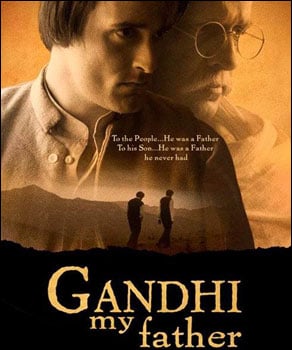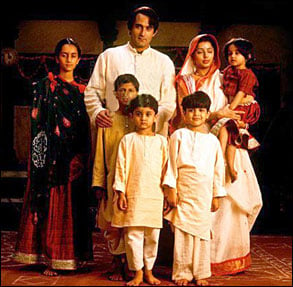|
|
| |
 |
Gandhi
My Father**1/2
*ing: Akshaye Khanna, Darshan Jariwala, Bhumika Chawla and Shefali
Shah
Directed by Feroze Abbas Khan
|
| |
Gandhi My father starts on a promising note. The year is 1948 and
a ragged, bearded man is admitted to a hospital, claiming to be the
son of the great Gandhi. The assertion is affectionately tossed aside
by the hospital attendants and he is filed in as a homeless vagabond.
And thus unfolds a story of Gandhi not many are familiar with, taking
us back to South Africa during the time of the apartheid (1906) and
introducing us to Gandhi, the father. As the title suggests, the primal
focus of the film is Gandhi's thorny relationship with his eldest
son, Harilal.
Gandhi is shown as a stubbornly idealistic and altruistic man, to
the point of self-punishment and neglect of his own family. Throughout
his struggle for anti-apartheid in South Africa and for the cause
of Indian freedom in the sub-continent, he is shown complacently smiling
at the helm of his non-violent, Satyagarh movement, asking from his
family much more than they had the courage to offer |
 |
| |
| The
first clash of ideals between father and son occurs when Gandhi keeps
Harilal and his other children away from formal education and makes
Harilal's wife go back to India, for the sake of focusing on the anti-apartheid
movement in South Africa. Harilal is portrayed as a man who jitters
in his father's presence and is afraid to voice his opinions or fight
back for his rights primarily as a son. |
| |
But
initially, Harilal does try taking on his father's role, repeatedly
going to jail in South Africa and protesting against apartheid. However,
when his desire to become a barrister is repeatedly scoffed by Gandhi
and the scholarship funds allotted to Gandhi's own family are given
away to other children by the altruistic leader, Harilal becomes bitter
and resentful.
They return to India, and having little education or resources, Harilal
fails to support himself in an honourable manner. He becomes embroiled
in a lifestyle of debt, embezzlement and alcoholism, aggravated by
opportunists trying to use Gandhi's name for personal profit.
Consequently, Harilal and Gandhi part ways--the former, bitterly and
dejectedly, and the latter, forever smiling and complacent. |
 |
| |
They
say Gandhi had two regrets in life - Jinnah and his son Harilal. The
film does capture these sentiments and on a positive note, it is not
an uncomfortable experience for a Pakistani, since there is no Jinnah
or Muslim bashing. However, the film seems painfully long and interest
in Gandhi and his son's relationship fizzles out half way in between.
The movie just seems to drone on and on without any sort of interesting
angle and/or excitement. The pace is far too slow and the ordinary
viewer finds the flick too monotonous for comfort.
The gist of the film, that Gandhi and Harilal didn't get along, was
hardly interesting enough to be stretched over for three hours, and
film ends having disappointed the viewer.
No matter how well Akshaye Khanna acted – along with the technical
directional aspects, Feroz Abbas Khan (the film's director) should
have kept in mind that historical films too, need a faster pace.
That being stated, Akshaye Khanna has truly proved his mettle as an
actor – his performance has not been anything short of stellar.
In the end, unless you want to brush up on your history, watch the
film, otherwise give it a pass, because you'll probably wind up snoring
after the first forty minutes.
-Maria Tirmizi *YUCK
**WHATEVER
***GOOD
****SUPER
*****AWESOME
|
| |
|

